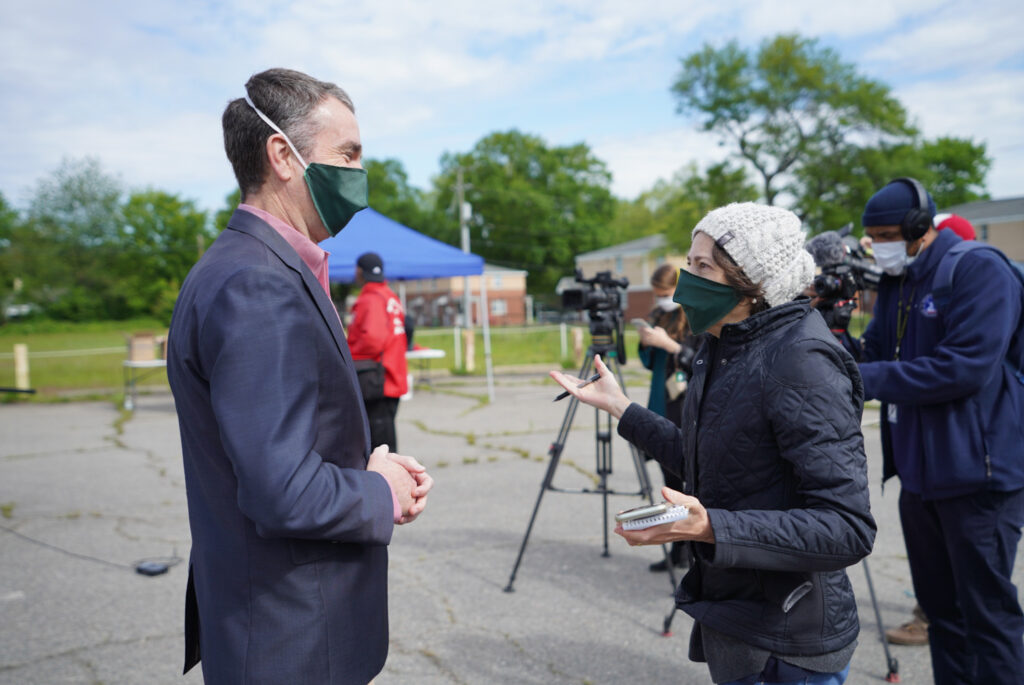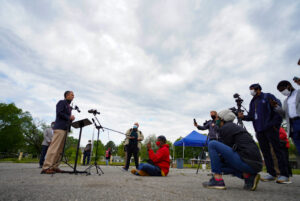Bantam Check-In with Laura Vozzella ’88
Laura Vozzella '88 is a journalist for The Washington Post. We caught up with her to ask a few questions about how the coronavirus has impacted her life and work this spring.

For you and your fellow journalists, how “big” is the coronavirus story?
Coronavirus is virtually all we’re writing about these days. Even stories that are not explicitly about the crisis are shaped by it. When Virginia’s General Assembly reconvened for its annual “veto session” in mid-April, for instance, the story was dominated by the unprecedented social-distancing measures taken to keep legislators safe. The House met outside the Capitol under a tent. The Senate spread out in a science museum, with one vulnerable senator walled off behind plexiglass. All the legislative action was aimed at slashing the state budget and otherwise adjusting to an economy crippled by COVID-19. Another example: I just filed a story on Virginia’s 2021 governor’s race, which ought to be gearing up by now but can’t because candidates are stuck at home.
Given that you have covered national and state politics, how do you assess national/state responses to the crisis?
Clearly no one at any level of government was prepared for a health crisis of this scale. I’m part of the team that covers the Virginia end of things, but that’s been tied up in what supplies the state could or could not get out of Washington. I live right near a Richmond-area rehab facility with one of the nation’s worst outbreaks, yet the staff there could not get enough personal protective equipment for weeks on end. Even as testing kits became more available, Virginia lagged most of the nation in testing. At the same time, Gov. Ralph Northam, a physician, was only the second in the nation to close schools for the year. He’s taking a cautious approach toward reopening, preparing to ease certain restrictions in most of the state but allowing densely populated Northern Virginia to delay until the numbers look better there.

Will the craft of journalism change as the result of the pandemic? If so, in what ways?
We’ve all certainly gotten used to working remotely. Right now it’s rare for me to go out to cover something other than a news conference, so things feel weirdly staged. (I can’t say I’d want to go inside that rehab center even if they’d let me.) I’m sure we’ll all get out to do more normal reporting as things open up again, but it could be a while.
How has the crisis and quarantine impacted you?
I’ve been lucky (as of this writing) that everyone in my family is healthy. For the most part, I like working from home and having more time with the family, though that makes for lots of distractions. My husband, Jeff Kriebel ’88, is a high school math teacher figuring out how to teach remotely. We have two teenagers, one currently consumed with AP test prep, the other with new recipes. (Homemade potstickers – five stars!)
Are there ways in which your liberal arts training informs your work and overall outlook today?
I can’t remember the last time anyone took me up on my offer to recite the Prologue to The Canterbury Tales, though I can still do it. (Thanks, Prof. Sheila Fisher!) I majored in English at Trinity and whenever I talk to young people interested in writing for a newspaper, I tell them they don’t have to major in journalism. A background in something else they’re passionate about–science, the arts, history–will inform their reporting. I also suggest that they get some newspaper internships along the way so they’ll have experience, clips, and contacts when the time comes to apply for a job.
Read Vozzella’s writing in The Washington Post.
